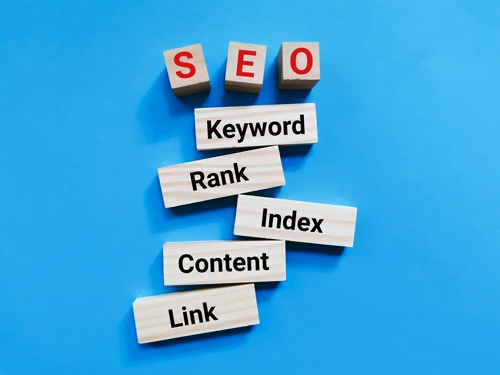
Optimizing a website for search engines is critical, and on-page seo plays a vital role in achieving this goal. On-page seo involves optimizing specific web pages to increase their ranking and attract more relevant traffic from search engines. This guide will offer a detailed overview of on-page seo covering key topics like keyword research, website structure, content optimization, and other important factors that impact on local seo and search engine rankings.
UNDERSTANDING ON-PAGE SEO

What is On-Page SEO and why is on-page seo important?
On-Page SEO refers to the optimization of individual web pages to rank higher in search engine results pages (SERPs) and attract relevant traffic. It involves optimizing various on-page seo elements such as content, title tags, meta descriptions, header tags, and internal linking. On-page optimization helps search engines understand the content and structure of a web page, thereby making it easier for them to crawl and index the web page content.
Effective on-page optimization can enhance a website’s visibility on search engine results pages, draw more relevant traffic, and enhance the overall user experience. Furthermore on-page SEO is an ongoing practice that demands consistent monitoring and optimization to outshine the competition.
How does On-Page SEO differ from Off-Page SEO?

On-Page SEO refers to the optimization of several on-page factors like content, tags, meta descriptions, header tags, and internal linking. These components assist search engines in comprehending a webpage’s content and structure, resulting in better search rankings. On-Page SEO also encompasses enhancing the website’s user experience by optimizing page load speed, mobile responsiveness, and site architecture.
Off-Page SEO, on the other hand, involves optimizing the website’s overall authority and reputation through external factors such as backlinks, social media engagement, and brand mentions. Off-Page SEO aims to improve the website’s reputation and authority in the eyes of search engines and users, which can result in higher rankings and more relevant traffic.
KEYWORD RESEARCH

By conducting keyword research businesses can identify the keywords and phrases that their target audience is using to search for information online which can be used to optimize website content, create blog posts, and develop a content marketing strategy that resonates with the target audience.
How to conduct Keyword Research?
Following are the steps to conduct keyword research:
Identify your target audience
Before conducting keyword research, it is important to identify your target audience and understand their needs and desires helping you to create content that resonates with your audience and attracts more traffic to your website.
Brainstorm potential keywords
Once you have identified your target audience, it’s time to brainstorm potential keywords that they might use to search for information online. Use a keyword research tool such as Google Keyword Planner, SEMrush, or Ahrefs to find potential keywords and phrases related to your business.

Analyze keyword search volume and competition
After you have brainstormed potential keywords, it’s time to analyze their search volume and competition. Use a keyword research tool to determine the number of searches that each receives and the level of competition for each target keyword.
Choose relevant, high-traffic keywords
Based on your analysis choose relevant and high-traffic keywords that have low competition. These keywords will help you improve your search engine rankings and attract more organic traffic to your blog post or website.
Incorporate keywords into website content
Use the keywords in your website copy, meta descriptions, tags, and header tags to optimize your website for search engines.
Keyword Research Tools

SE Ranking
SE Ranking is an all-inclusive SEO tool that features a robust keyword research tool. With SE Ranking businesses can execute keyword research and analyze critical metrics such as search volume and competition. The tool also furnishes keyword recommendations and enables businesses to track their keyword rankings over time.
WebCEO
WebCEO provides keyword recommendations and enables businesses to monitor their keyword rankings over time. Moreover, WebCEO includes a distinct feature that permits businesses to examine their competitors’ keyword strategies.

Semrush
SEMrush is a well-known SEO tool that focuses on keyword research, competitor analysis, and optimizing Google Ad campaigns.
Google trends
Google Trends is a free keyword research tool that permits businesses to assess the popularity of search terms over time. By utilizing Google Trends, businesses can recognize trendy topics and search terms and apply them to optimize their website content. The tool also delivers observations into geographic and demographic trends correlated with specific search terms.
Ubersuggest
With Ubersuggest, businesses can perform keyword research and identify the best keywords to target for their website. The tool also provides insights into related search terms and allows businesses to track their keyword rankings over time.
WEBSITE STRUCTURE

URL Structure
URL structure pertains to the arrangement of URLs on a website. A clear and concise URL structure facilitates website navigation for users and helps search engines to comprehend the content of a page.

There are several best practices to follow when it comes to URL structure:
Keep URLs concise and descriptive: URLs should be short and descriptive, with the focus on the primary keyword or topic of the page.
Use hyphens to separate words: Hyphens are preferred over underscores or spaces in URLs, as they make it easier for both users and search engines to read.
Avoid using dynamic URLs: Dynamic URLs are those that include parameters such as ?=id123. These types of URLs can be difficult for search engines to read and understand and can negatively impact SEO.
Navigation
Navigation refers to the way in which a website is organized and the external links that connect its pages.

Here are some best practices to follow when it comes to navigation:
Use clear and concise navigation: Navigation should be easy to understand and use with clear labels that accurately describe the content on each page.
Use a hierarchical structure: A hierarchical structure makes it easy for users and search engines to understand the relationships between pages on a website.
Use breadcrumb navigation: The usage of breadcrumb navigation aids site visitors in keeping track of their current location and retracing their steps.
Internal Linking
Internal linking refers to the links within a website that connect its pages.

Here are some best practices to follow when it comes to internal linking:
Use descriptive anchor text: Anchor text should accurately describe the content on the page being linked to and should include relevant keywords.
Link to related content: Internal linking helps users and search engines navigate a website and understand the relationships between pages.
Use a reasonable number of links: Too many internal links can be overwhelming for users and can negatively impact SEO.
CONTENT OPTIMIZATION

Content optimization is the process of improving the quality and relevance of the content on a website to make it more attractive to search engines and users.
Things to keep in mind while optimizing content are as follows:
Content Quality
High-quality content is written in a clear and concise manner and provides valuable information to the reader. It answers their questions or solves their problems, which can keep them engaged and interested in the website. This type of content is also more likely to be shared on social media or linked to by other websites which can improve the website’s search engine rankings.
Content Relevance
Having relevant content is crucial because it aids search engines in comprehending the page’s subject matter, thereby determining if it is a suitable match for the search query. One can improve content relevance by incorporating relevant keywords and phrases in the content, as well as in page content, meta titles and descriptions. By doing so, it is possible to enhance the website’s search engine optimization (SEO) performance.

Meta Titles and Descriptions
HTML tags known as meta titles and descriptions offer essential information about a webpage to search engines. The meta title is visible at the top of the browser window and appears in search results, while the meta description appears just below the meta title in search results and provides a summary of the page’s content. One can enhance search engine rankings by optimizing meta titles and descriptions with relevant keywords and phrases.
Headings and Subheadings
Headings and subheadings are HTML tags that break up content into sections and make it easier to read. They also provide important signals to search engines about the structure and content of the page. To optimize headings and subheadings it is important to use relevant keywords and phrases, and to organize the content in a logical and easy-to-read manner.
Keyword Density
Keyword density refers to the number of times a particular keyword or phrase appears on a web page relative to the total number of words on the page. While it is important to include relevant keywords and phrases in content, it is also important to avoid overusing them. Overuse of keywords also known as keyword stuffing, can negatively impact search engine rankings.
KEY ELEMENTS OF TECHNICAL SEO

Technical SEO refers to the technical elements that can impact a website’s search engine ranking, user experience, and overall performance. Optimizing the website’s technical infrastructure to ensure that search engine crawlers can easily find, crawl, and index the website’s content are all aspects of technical seo.
Website Speed
Site speed consists how fast a website loads and renders its content to users. Site speed is an essential ranking factor for search engines because it affects user experience. Users are more likely to abandon a website that loads slowly or takes too long to load. To improve website speed, website owners can implement various tactics, such as optimizing images, compressing CSS and JavaScript files, and minimizing HTTP requests.

Mobile Responsiveness
Mobile responsiveness denotes a website’s capacity to adjust to varying screen sizes and devices, such as smartphones, tablets, and desktops. Given that most online searches are now carried out on mobile devices, it is crucial to ensure that a website is mobile-friendly. Thus, optimizing a website’s mobile responsiveness is imperative to enhance user experience and search engine performance.
Sitemap and Robots.txt
A sitemap is a file that lists all the pages on a website, making it easier for search engine crawlers to find and index all the website’s content. A robots.txt file, on the other hand, tells search engine crawlers which pages they can and cannot crawl on a website. Having a sitemap and a robots.txt file is essential for ensuring that search engines can easily find and index all of your website’s content.
SSL Certificate
An SSL certificate is a security certificate that encrypts data exchanged between a website and its users. Having an SSL certificate installed on your website not only improves website security but also improves search engine ranking. Google has even confirmed that having an SSL certificate is a ranking factor in its search engine algorithm.
MONITORING AND MEASURING

Monitoring and measuring can help you identify technical issues that may be negatively affecting your website’s ranking and can improve search visibility further on. Google analytics and Google search console are two useful tools for monitoring and measuring campaigns.
Google Analytics
Google Analytics provides insights into your website’s traffic and user behavior. You can use this tool to track the number of visitors to your website, their geographical location, the pages they visit, and the amount of time they spend on each particular page; through this you can determine which pages are performing well and which ones need improvement.
Google Search Console
On the other hand, Google Search Console offers insights into a website’s search performance. It provides valuable information to monitor a website’s visibility on Google search results and identify issues that may be affecting its search engine ranking negatively. With this tool you can detect crawl errors, index coverage issues, and security problems that may be hampering your website’s search engine performance. By addressing these issues promptly, it is possible to optimize your website’s search engine ranking and enhance its online visibility.
Other SEO Tools

Ahrefs
Ahrefs is a comprehensive SEO tool that offers a wide range of features to help you optimize your website for search engines. One of its main features is its site explorer which allows you to see the backlink profile of any website which can be useful in identifying link building opportunities for your own website.
Ahrefs also offers a keyword explorer tool that allows you to research keywords and analyze their search volumes, keyword difficulty, and click-through rates. The tool can also show you related keywords and suggest content ideas based on your keyword research.
Another useful feature of Ahrefs is its content explorer which allows you to search for popular content in your niche and analyze its performance metrics, such as social shares and backlinks.

SpyFu
SpyFu is an SEO tool that allows you to spy on your competitors’ online marketing strategies. One of its main features is its competitor research tool which allows you to see your competitors’ top organic and paid search keywords, ad copies, and backlinks.
With SpyFu, you can analyze your competitors’ online strategies, identify gaps in their marketing tactics, and develop a comprehensive SEO plan to outperform them. In essence, SpyFu is a competitive intelligence tool that can help you stay ahead of the competition and achieve your online goals.
Hubspot
With Hubspot’s SEO tool, you can conduct keyword research and optimize your website’s on-page seo elements, such as meta titles, descriptions, and header tags. The tool also provides recommendations for improving your website’s technical SEO, such as page speed and mobile responsiveness.
CONCLUSION

In conclusion, is an important aspect of Search Engine Optimization that requires attention to detail and optimization of various elements on a website. By optimizing on-page elements, a website can improve its visibility and ranking on search engine results pages. Keyword research plays a significant role in On-Page SEO, as it helps in understanding the user search intent and creating content that satisfies their search queries.
Tools like SE Ranking, SEMrush, and Google Trends can be used for keyword research, while Ahrefs, SpyFu, and Hubspot can assist in competitor analysis and tracking website performance. The website structure, content, technical SEO, and monitoring and measuring are crucial aspects of on-page seo that need to be optimized to achieve higher search engine rankings and more website traffic. By implementing the strategies outlined in this guide, website owners can improve their website’s visibility and ultimately drive more traffic and revenue to their business.
We at Ruskin Felix Consulting help businesses in managing on-page seo for their website. We help clients transform, grow and operate while fostering trust through assurance with our services and solutions. Please feel free to contact us at contact@ruskinfelix.com











